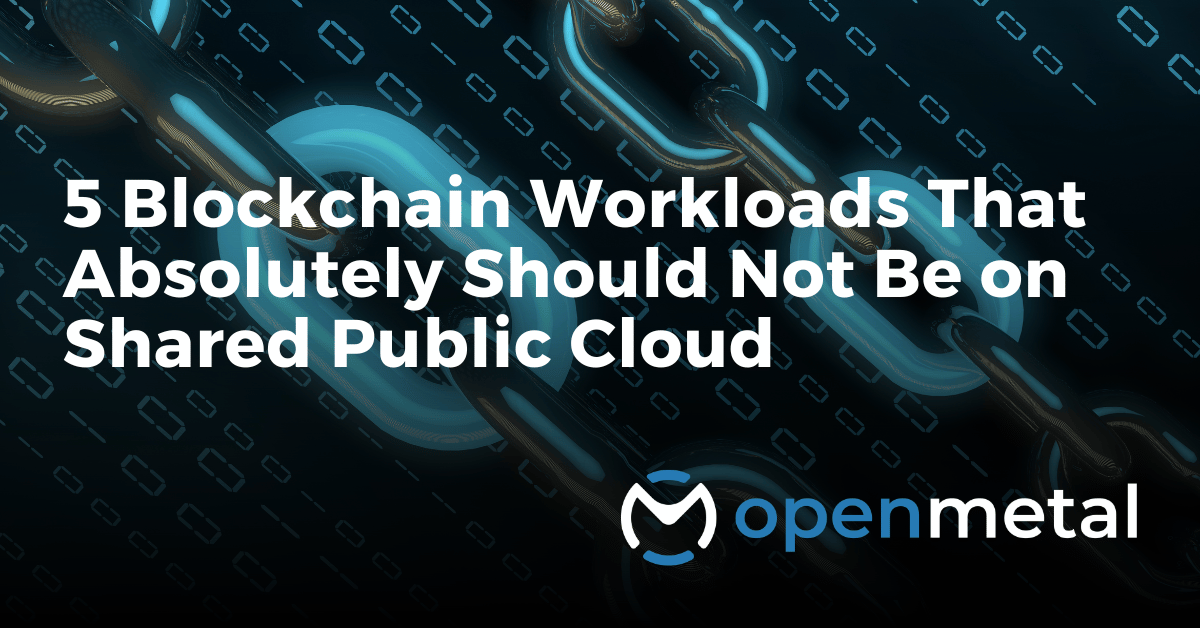
When you’re running blockchain infrastructure, not all hosting environments are created equal. While shared public clouds work fine for many applications, certain blockchain workloads demand more control, security, and performance than multi-tenant environments can provide.
If you’re operating validator nodes, running MEV infrastructure, or managing privacy-sensitive blockchain applications, you need to understand why a shared public cloud might be putting your operations at risk—and what alternatives exist.
The Hidden Costs of Running Blockchain on Shared Infrastructure
Shared public cloud environments introduce several challenges for blockchain workloads:
Performance variability affects your ability to maintain consistent block times and transaction processing. Research shows that performance in public clouds can vary by up to 30% due to resource contention.
Security concerns arise from multi-tenancy, where your blockchain nodes share physical hardware with unknown neighbors. This creates potential attack vectors that don’t exist in dedicated environments.
Limited control over the underlying infrastructure prevents you from optimizing for blockchain-specific requirements like disk I/O patterns, network latency, or CPU scheduling.
5 Blockchain Workloads That Need Dedicated Infrastructure
1. Validator Nodes for Proof-of-Stake Networks
Running validator nodes on shared infrastructure is asking for trouble. Ethereum validators, for example, require exceptional uptime and consistent performance to avoid slashing penalties.
When you’re staking 32 ETH (worth over $100,000), even minor performance hiccups can cost you dearly. Validators need:
- Sub-second response times for attestations
- Guaranteed network bandwidth for peer-to-peer communication
- Predictable disk I/O for blockchain state management
On OpenMetal’s bare metal servers, you get dedicated resources that eliminate noisy neighbor problems. Your validator runs on hardware you control, with network performance you can count on.
2. MEV (Maximum Extractable Value) Infrastructure
MEV searchers and block builders operate in a microsecond-sensitive environment where latency directly translates to profit or loss. Shared cloud environments simply can’t provide the consistent, ultra-low latency these systems require.
MEV infrastructure needs:
- Direct network peering with major validators
- Custom network routing configurations
- Hardware-level timing precision
- Complete isolation from other workloads
OpenMetal’s hosted private cloud gives you the control to optimize every aspect of your MEV infrastructure, from kernel parameters to network topology.
3. Privacy-Focused Blockchain Applications
Privacy-preserving blockchain applications—whether using zero-knowledge proofs, secure multi-party computation, or confidential computing—cannot afford the security risks of shared infrastructure.
These workloads require:
- Hardware security modules (HSMs) or trusted execution environments
- Complete memory isolation
- Auditable security boundaries
- Protection against side-channel attacks
When you’re processing sensitive financial data or personal information on-chain, shared cloud environments introduce unacceptable risks. Dedicated infrastructure ensures your privacy guarantees remain intact.
4. High-Frequency Oracle Networks
Oracle nodes that provide real-time price feeds or other critical data to smart contracts need rock-solid reliability. As Chainlink’s documentation emphasizes, node operators must maintain strict security and performance standards.
Oracle infrastructure demands:
- Multiple redundant data sources
- Consistent sub-second response times
- Protection against manipulation attacks
- High-availability configurations
OpenMetal’s infrastructure provides the foundation for building oracle networks that smart contracts can depend on.
5. Blockchain Archival and Analytics Nodes
Running full archival nodes or analytics infrastructure requires massive storage and compute resources. On shared cloud, you’re paying premium prices for every terabyte stored and every query processed.
Archival nodes need:
- Petabyte-scale storage capacity
- High-performance SSD arrays for chain data
- Substantial RAM for in-memory databases
- Consistent query performance for analytics
OpenMetal’s Ceph storage clusters provide the scalable, cost-effective storage infrastructure these workloads require, without the per-GB pricing that makes archival nodes prohibitively expensive on public cloud.
Why Bare Metal and Private Cloud Make Sense for Blockchain
The unique requirements of modular blockchains and other advanced blockchain architectures demand infrastructure you can customize and control.
Predictable Performance: With dedicated hardware, you eliminate the variability that plagues shared environments. Your blockchain workloads get consistent CPU cycles, memory bandwidth, and network throughput.
Enhanced Security: Physical isolation means your sensitive blockchain operations aren’t sharing hardware with potentially hostile neighbors. You control the entire security stack from hardware to application.
Cost Efficiency at Scale: While shared cloud might seem cheaper for small workloads, dedicated infrastructure becomes more economical as you scale. You’re not paying marked-up prices for compute, storage, and bandwidth.
Customization Freedom: Need specific kernel parameters? Custom network configurations? Specialized hardware? With bare metal and private cloud, you have complete control over your infrastructure stack.
Making the Move to Dedicated Blockchain Infrastructure
Transitioning from shared cloud to dedicated infrastructure doesn’t have to be complex. Here’s how to evaluate whether your blockchain workloads need dedicated resources:
- Calculate your true cloud costs including compute, storage, bandwidth, and any blockchain-specific services
- Assess your performance requirements focusing on latency, throughput, and consistency needs
- Evaluate security requirements particularly for validator nodes or privacy-sensitive applications
- Consider your scaling trajectory as dedicated infrastructure becomes more cost-effective at scale
If you’re running any of these five blockchain workloads on shared public cloud, it’s time to reconsider. The risks to performance, security, and your bottom line are too significant to ignore.
OpenMetal’s bare metal and private cloud solutions provide the dedicated infrastructure your blockchain workloads need, with the support and expertise to ensure successful deployment.
Read More on the OpenMetal Blog



































